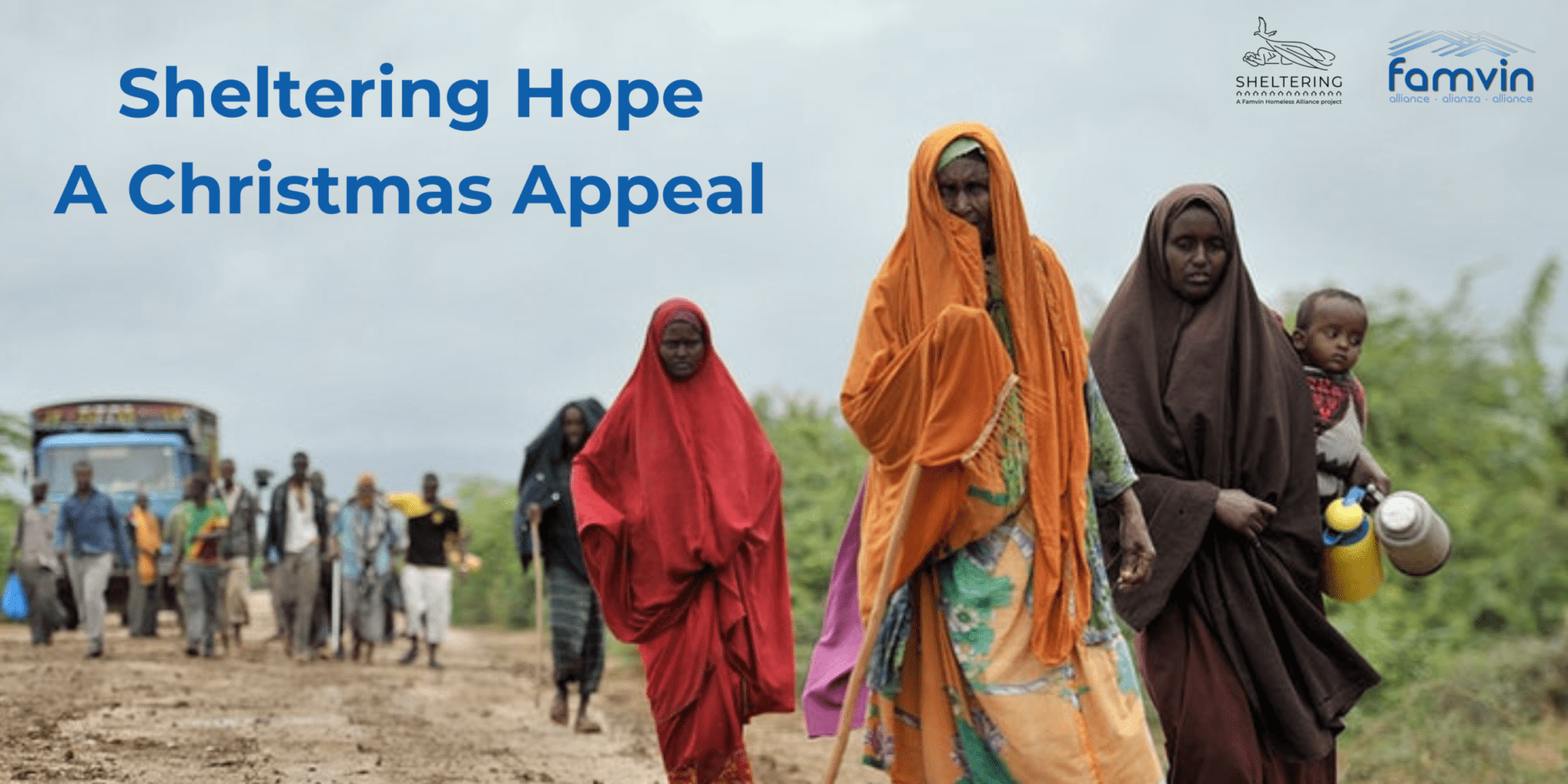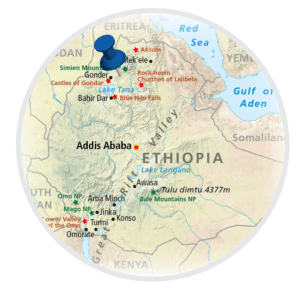
Sheltering Hope: an appeal to support the Vincentian Family’s response to the war in Ethiopia
In 2022, the UNHCR announced that over 100 million people globally have now been forced to leave their homes – describing this record-high figure as “a dramatic milestone that few would have expected a decade ago”.
Much of this displacement is driven by worldwide food insecurity and the climate crisis, however the recent sharp rise has been attributed largely to new and escalating conflicts.
Just as the suffering in Ukraine has rightly received much media focus, for the Famvin Homeless Alliance Christmas Appeal we would like to highlight one of the crises that has received less attention, in Ethiopia. The appeal will support the work of the Vincentian Family in providing life-saving support and hope to those that have been affected and displaced by the conflict.
Eden’s story
Eden is a 29-year old woman who has been living in IDP centres for over two years, as a result of the conflict in Ethiopia. The fighting started in the northern region of Tigray in November 2020 – between the federal government and regional forces – and the following years of conflict have resulted in devastating consequences. Displaced people like Eden are facing unimaginable hardship – food, supplies and shelter are limited, and the trauma they have experienced is having a significant impact on their mental health. Eden’s individual story is told here in more detail, but sadly her experiences are shared by many.
Before the war
Eden was born in Adigrat, and raised by a single mother in a poor household. She helped her mother by working from a young age, but Eden’s mother was dedicated to ensuring her children attended school and had chances at a better life. Eden’s older brother was killed in a fight at only 17 years old, leaving Eden and her mother heartbroken. Determined to succeed, Eden went on to graduate from university with a degree in Business Administration and Management. Her achievements continued as she completed her masters’ degree, and later become a lecturer. Eden had broken out of poverty, established a good life for herself, and managed to take care of her mother until she passed.
“For the first time in so long, I was truly happy. I had a hopeful future ahead of me and my mom had lived long enough to see it.”
The war
Unfortunately, Ethiopia became embroiled in political and ethnic discord. After receiving abuse and threats based on her Tigrayan background, Eden lost her home and job, and had to move in with her aunt. Although Eden managed to find a new job, unfortunately the tensions continued to rise as did the threat of war. Fighting broke out, and she received news that an attack was fast approaching her location. Eden fled on foot, with nothing but the clothes on her back and the few emergency supplies she could gather.
Eden was subjected to physical abuse and sexual violence from soldiers on her journey, a horrific trauma experienced by so many others during the conflict. Many war crimes have been evidenced, with some estimates stating that a staggering 120,000 women and minors have been raped. Eden was then helped to arrive at a temporary shelter for IDPs, but the conditions were awful – spaces were overcrowded and food was scarce, with essential services such as banking and communications unavailable. So far at least 2.8 million people have been displaced from their homes, many facing similar circumstances to Eden. Food insecurity and malnutrition is estimated to be impacting over 13 million people in Tigray and nearby regions, and essential healthcare services have become extremely limited (WHO data).

The hope
Through the Vincentian Family’s help, Eden was able to access a pilot project which offers psychosocial support for survivors of conflict-related sexual violence. Via trained facilitators (who are also survivors themselves), groups of women meet to share their stories with one another without fear of judgement. Although Eden had become very withdrawn, she attended every group session without fail. The sessions take a “Helpful Active Listening” approach – pioneered in Rwanda following the 1994 genocide – and they aim to help survivors better understand their circumstances, identify coping strategies and build their resilience. There is also a safe house with space to host up to 80 survivors, and emergency supplies (such as cash and dignity packs) can be distributed to those in need.
If fundraising efforts are successful, the Vincentian Family hopes to support more people affected by the conflict in the following ways:
- Expanding the provision of the group support sessions, to help more survivors heal from trauma related to the conflict
- Setting up a trauma centre in Alitena – an area with many people reporting they have been affected by sexual violence – with a target of supporting 1000 people per year
- Distributing post-war recovery packs to help people rebuild their lives – this could include household essentials, as well as items to promote dignity
The Vincentian Family branches were among the first responders to this tragic crisis in the region, providing life-saving assistance to vulnerable people in their communities. With your generous support, we can help the Vincentian Family continue to:
- Provide essential food to those most vulnerable, and without means to provide for themselves
- Help those affected by post-traumatic stress disorder by providing psychosocial and emotional support to aid their recovery
- Support families to secure their livelihoods and rebuild their lives
* The details of this story have been altered slightly to protect the identity of the beneficiary. Alterations have been made to the name, age and location of the beneficiary. Otherwise all information provided is accurate as narrated by the beneficiary.
DONATE!
For donations, please contact fha.info@famvin.org to receive the detailed information.
Context
The Tigray War, Ethiopia
Referred to as the ‘world’s forgotten conflict’ by the Guardian, fighting broke out in Tigray, Northern Ethiopia, in November 2020 between the federal government and regional forces, and two subsequent years of conflict have had devastating consequences.
2.6 million people have been displaced from their homes, the vast majority of those who fled women and children. The scale of civilian death and destruction caused by the war led The New York Times to describe it as “one of the world’s bloodiest contemporary conflicts”. Up to 600,000 people have reportedly lost their lives. Whilst significant numbers have been killed in direct attacks, the majority of casualties have been due to a lack of food or healthcare. The region has been largely cut off from humanitarian aid, both due to dwindling fuel reserves and lack of supplies. In August, the World Food Programme said almost half the region’s population was in severe need of food.
There is clear evidence of war-crimes from all parties, including wide-spread sexual violence, with some claiming that a staggering 120,000 women and minors have been raped.
People living in the region have been cut off from communication channels, banking systems and in many places electricity altogether. Children haven’t been at school, which coming halfway through the pandemic means that most children have missed three years of education.

The Vincentian Family’s response
The Vincentian Family were among the first responders to this tragic crisis in the region, providing life-saving interventions targeting the most vulnerable groups in their communities. Even when supplies had run low, they continued to visit those suffering, to offer them loving care and solidarity during their times of need.
The Vincentian Family branches working in Ethiopia are committed to serving the poorest of the poor by providing health, education and community development services and pastoral care services, as well as responding to the basic needs of food, water, sanitation and shelter. In a letter earlier this year, a Vincentian Family leader said:
“I beseech you to pray on our behalf, and become our voices as we are about to be silenced once more. In the name of the poor, please advocate for this madness to end, as your support is critically needed right now. This is the juncture from which there will be no return, and in such time, it would show how humanity could prevail over injustice and cruelty”.
There has been a recent glimmer of hope, after a peace agreement was signed by all parties on November 2nd, but the post-war situation is bleak and overwhelming. The people of Tigray have been under complete siege for two years: people have lost their homes and livelihoods and families have been torn apart. Infrastructure has been destroyed. Many have witnessed and endured severely traumatic events. Food is still scarce and people are in desperate need.
Now is a crucial time to support the Vincentian Family in Ethiopia to help their people to recover from this devastating conflict.
Reflection from Ethiopia
How have the teachings of St Vincent de Paul helped the Vincentian Family in Ethiopia to cope during two years of war and to support those around them?
The call of a Daughter of Charity is to imitate Jesus in the spirit and charism of St. Vincent, hence, Vincentian values are Gospel values. Suffering was lived experience for our Lord and St. Vincent from birth to death but it did not stop them from accomplishing their mission. During the last two years, thousands of people have lived the passion of Christ in Ethiopia. In our part, our life resembled the devastating experience of war in France in the 17th Century. Vincent encouraged his followers to identify with the suffering of the inhabitants through prayer and sacrifice in 1635, as he became a bridge between the poor and the resourceful to save lives that were at risk of perishing. The teachings of St. Vincent on the importance of prayer, imitation of Christ, trust in Divine Providence, on charity, networking and on surrendering our will to God were the driving forces. These helped us to live our call, to be daring in serving both victims and perpetrators without counting the cost, to build bridges of forgiveness and sow seeds of hope.
Vincent advised a young confrere appointed superior to ask the Son of God, “Lord, if you were in my place, how would you act on this occasion?” (CCD:XI:314). One of the many challenging incidents during the last two years was the imprisonment of our six sisters, simply because they come from a certain tribe. This reminded me of the injustice Vincent experienced when he was accused of theft though he was innocent. Moreover, our Vincentian values have helped us to see the person with the eyes of mercy and respect inspective of his/her background, religion, ethnicity, political ideology and or even their contributions towards war; to respond to their needs with kindness, generosity and prayer. St. Vincent said, “Seek peace and follow after it.” (CCD:I:264). Our values have helped me in my leadership role, in courageously choosing peace and calling my sisters to be visible witnesses to Jesus who continues to suffer in those who lost everything, including their loved ones. It is with courage that we build a better future. The new perspective is to go beyond doing justice in order to heal the past and to build the future.